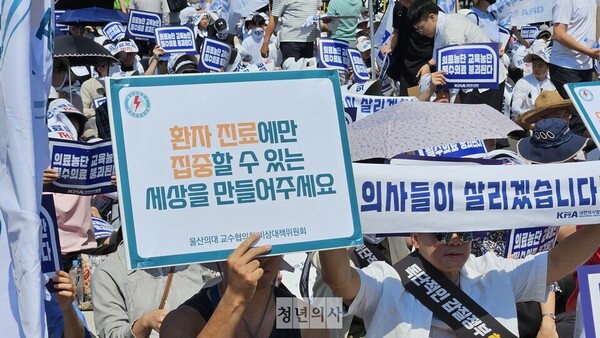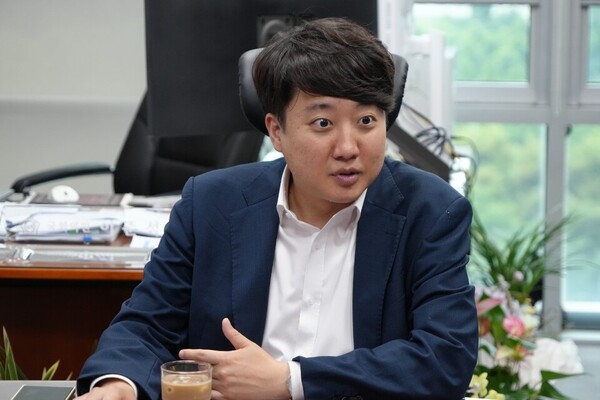"Hopeless."
This is what doctors say most after a long sigh. That's a remark acknowledging there is no way to resolve the ongoing confrontation between the government and the medical community. It also reflects their despair for not knowing a method to "turn back” the collapse of the healthcare system. As the doctor-government standoff sparked by the increase in medical school enrollment quota prolongs, finding a solution is also getting increasingly difficult.

The National Assembly has tried to mediate to end the conflict, but it is never easy. A hearing on the medical emergency held by the Assembly's Health and Welfare Committee on June 26 exposed the reality of the deepening conflict. The backgrounds of the government's decision to increase the number of medical students by 2,000 were not revealed, and the medical community's demand for a "re-discussion from the ground up" was not even considered.
The Reform Party is the only political party that has voiced its opposition to the increase in medical school admissions and supports the “return to the ground zero.” In an interview with the Korean Doctors’ Weekly, a sister paper of Korea Biomedical Review, last Friday, Rep. Lee Jun-seok, founder of the Reform Party, pointed out that the current political situation resulted from an “obsession with the number." He also criticized the government's policy to increase the number of medical school students as nothing more than a "fallacy based on a trickle-down effect.”
Lee emphasizes going back to the drawing board because he thinks the healthcare reform process, including expanding medical school students, lacks a "healthcare policy direction.” The adverse effects of this are spreading not only in the medical field but also in education and industry. In particular, the so-called "medical school black hole" phenomenon, in which top science and engineering students are attracted to medical schools, is also intensifying.
Commenting on Minister of Health and Welfare Cho Kyoo-hong's statement during the parliamentary hearing that he "decided" to increase the number of students by 2,000, Lee said the remark was “not persuasive" and was convinced that President Yoon Suk Yeol's will must have come into play. The Reform Party founder emphasized the government's responsibility, saying that the re-discussion from the ground up is "possible if only the president has the will.”

Question: The government and the medical community are seriously at odds. Trust is broken and there is no room for dialog.
Answer: The outcome of the breakdown of trust between the government and doctors was expected. Doctors have repeatedly stated that they do not want to increase the number of medical students. We all knew it would be a tough negotiation, but no one would have thought the government would suddenly announce an increase of 2,000 students. It's even more absurd that the government thought it could solve the problem this way. After all, the ongoing standoff (between the government and doctors) resulted from obsessing over numbers without having a clear idea of where Korean healthcare should be headed.
Q: Why do you think the government pushed so hard to increase the number of medical school admissions by 2,000?
A: The rationale for increasing the number of medical school students is the “trickle-down effect in the healthcare industry.” But let's look at the increase in law schools, which aimed to expand and popularize legal services, including in rural areas. However, in most rural areas, (lawyers) can't make enough money, so there is no evidence that rural legal services have improved, although the number of people with lawyer qualifications, such as those in charge of corporate legal affairs, has increased.
The general election might have played a part in the ruling camp’s push ahead with expanding medical school admissions even though there were sufficient opposite examples (such as the expansion of law schools). Now that the general election is over and a collective judgment has been made on the Yoon administration, I think it's time for the government to review the entire policy.
Q: The plan to implement the medical school entrance exam has already been decided. There is a strong feeling that the number of medical school students in 2025 cannot be changed. The return of trainee doctors is also unlikely. Do you think it is possible to return to the drawing board?
A: It's normal for the ruling and opposition parties to have different positions on issues. However, the opposition Democratic Party of Korea says it favors increasing the number of medical school students. I would rather create a place for rational debate, but on the flip side, I think both parties are afraid of that rational debate taking place.
However, the situation is serious now. I have come to think the government should withdraw its plan right now after looking at statistics, which show the leave of absence from Seoul National University’s College of Science and Engineering has increased rapidly. If the medical school enrollment quota is changed, the second semester of this year will be a disaster. You can see the president's words are hitting not only the medical community but the entire natural science community in Korea. The whole industry is bound to face a severe workforce supply and demand problem.
There is nothing that cannot be turned back. We can stop it if we want to even if we have to use force because the policy has started too forcefully. The President cannot determine it. We need to actively educate the public about what is happening. However, the problem is the political situation, in which the two major parties favor increasing the number of medical school students. So, it is difficult to establish a debate despite the clarity of the Reform Party's voice, which is unfortunate.
Q: You also spoke directly with trainee doctors. What did you think when you met and talked to them?
A: Trainee doctors indeed have wide responsibility in large hospitals, and, unfortunately, they are being pushed to the front of the struggle. They are supposed to focus on their training and eventually have more time for self-development for better medical practice. However, they now deal with human lives for hourly wages close to the minimum wage. The current system of medical resident training is unsustainable.
Also, I don't know why Korea has to make a special law to hold doctors responsible for medical accidents when in other countries they are not even subject to lawsuits and are often immune. Making it a special law as if it’s a good deed doesn’t make sense. Such populist behaviors can lead to passive medical practice in the field. At least in Korea, I don't think it's possible that any doctor would intentionally miss a diagnosis.
Q: The Minister of Health and Welfare said at a parliamentary hearing that he decided to increase the number of medical school students by 2,000 on his own. What do you think about this?
A: I don't think the Minister of Health and Welfare is the kind of person who can make such a “big move.” If he (made the decision) and did not consult with the president beforehand, he should step down immediately. The medical field turned into a mess (due to doctor-government conflicts) but officials wouldn’t (solve it), which means that the president is aware of and approves of it. Maybe the president might have encouraged it. That's why the Health and Welfare Ministry's story is not convincing.
Q: Since the hearing, there have been more and more voices in the medical community calling for the resignation of the minister and vice minister of the Health and Welfare Ministry.
A: It also seems strange that the Health and Welfare Ministry is getting away after making such a big mess. Since the president has recognized and virtually ordered it, it will inevitably go in the same direction even if the minister and vice minister change. If the minister and vice minister change now, they might even be promoted later. I want to hold them accountable because they have to produce responsible results.
Its spillover effects will be seen as early as the latter half of this year. You'll see the collapse of science and technology right away, and the medical field is no exception. Secondary hospitals may seem to be booming in the short term. However, if doctors at secondary hospitals are appointed professors and leave for the Seoul metro region, regional medical care will collapse. I don't know who this policy is really for and who it's satisfying. I don't think even patients are happy with this policy the government is promoting.
Related articles
- National university hospitals face bankruptcy risk amid $912 mil. revenue drop
- Feeling sorry and helpless, a surgeon chose to fast
- Angry patients took to the street, chanting ‘No patients, no doctors’
- [Contribution] What happened when SNU doubled its medical school admissions in the early 1980s
- Foul-mouthed, conflict-mongering KMA head emerges as medical community’s biggest risk
- Hardline medical professors call for boycotting student recruitment amid growing skepticism
- 60% of Koreans doubt scientific basis for medical school enrollment increase: survey
- 96% of medical students to boycott state medical exams: survey

